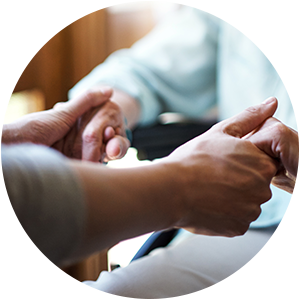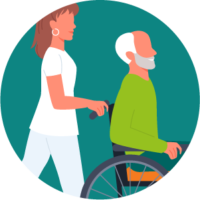
Caring for those who care for others: how we can support caregivers in our community.
This past week we observed National Caregiver's Day! Caregivers support our community by caring for those who may need extra assistance or help maintaining their physical well-being or completing their day-to-day activities—like the elderly, the disabled, the sick, or young children.
Caregivers can be informal, like a spouse, neighbor, or friend, or formal, like a daycare or long-term care facility. Regardless of whether someone is an informal or formal caregiver, caring for others on a part-time or even full-time basis can be challenging and often requires a great deal of time, energy, and effort.
It's also a role that can, unfortunately, go unrecognized. That's why we want to offer a big "thank you!" to those who provide care for others. You play an important role in keeping our community safe and healthy, and your hard work and dedication to caring for others doesn't go unrecognized. We also want to share some ways caregivers support our community and how we can help support them!

How caregivers support our community:
As we mentioned, caregivers support our community by caring for those who may not be able to care for themselves. They might help someone with their daily routine like getting dressed, taking a shower, using the restroom, or taking medication. They might also help someone maintain their home life by completing household chores, walking animals, running errands, paying bills, or preparing meals.
Without caregivers, many people in our community wouldn't receive the care they needed to maintain a good quality of life or good health. Informal caregivers can also help reduce the strain put on care facilities that might not have the room or staff to support someone in need.

How we can support caregivers:
It can be easy for a caregiver to put off caring for themselves—especially if the person they care for requires a lot of hands-on support. However, not taking time for oneself can lead to feelings of burnout, exhaustion, or physical and emotional distress over time. If someone you know is actively acting as a caregiver, there are ways you can help support them so they can take care of themselves too.
You can run errands for them, check in with them throughout the day, offer to take over responsibilities so they can take a break (for informal caregivers), bring them lunch or prepare dinner, or offer a listening ear if you think they may need someone to talk to.
Remember, caregivers are often at higher risk for health problems that can result from sleep deprivation, poor eating habits, exercising less, and working when sick. For more ways you can support caregivers, visit: Supporting Caregivers | CDC Don’t forget to thank those who spend their time caring for others! If you would like to learn more about resources available for caregivers, please visit: Caregiver Support in WA | Aging & Long Term Care of Eastern Washington (altcew.org)
